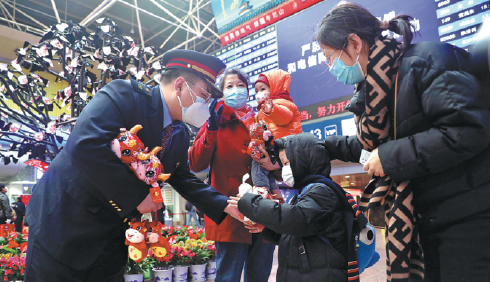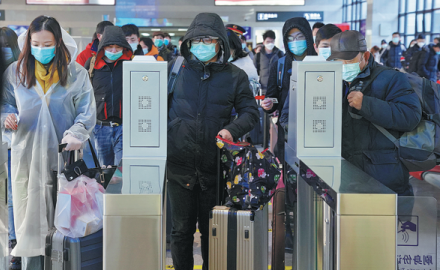Public heed advice, shun travel for holiday
State railway group estimates number of passengers to go down by a quarter

BEIJING-China kicked off its largest annual travel season on Thursday, with far fewer passenger trips expected amid stringent pandemic control measures.
In the 40-day travel season, many people will travel to reunite with their families for Lunar New Year, or Spring Festival, which falls on Feb 12 this year.
Following the resurgence of sporadic COVID-19 cases and measures taken to reduce people's movement nationwide, China State Railway Group on Wednesday reconfirmed its adjusted forecast for railway passenger trips during this year's travel season, down from 407 million to 296 million.
To reduce the flow of personnel and curb the spread of the pandemic, many places across China have encouraged residents and migrant workers to stay put to celebrate the festival.
Miao Biao, a migrant worker in Hefei, capital of East China's Anhui province, said it would be the first time in 11 years he would spend the weeklong holiday in Hefei instead of his hometown in the city of Fuyang.
"My parents have bought red couplets and lanterns as festival decorations. We've decided to video chat with our relatives and distribute digital lucky money via WeChat," said Miao, 30.
According to home appliance maker Whirlpool China, where Miao works, about a quarter of its 2,600 workers have chosen not to return to their hometown during the holiday.
The company will grant them cash, holiday gifts and a three-day vacation for a home visit in April. It will also reimburse their travel expenses, said Lu Tao, vice-president of human resources for Whirlpool China.
Many local authorities and companies have rolled out measures to provide better benefits to those staying put.
Hangzhou, capital of East China's Zhejiang province, has launched a plan to distribute 1,000 yuan ($150) to each migrant worker who chooses to stay in the city. Migrant workers who remain in Suzhou, Jiangsu province, can enjoy free visits to more than 10 major tourist attractions there during the holiday.
While workers like Miao have chosen to stay where they are, others have arrived home early to avoid the peak period for travel.
Armed with a negative COVID-19 test result, Zhang Baosheng, who works in Huzhou, Zhejiang province, boarded a high-speed train bound for the rural area of Anhui province in mid-January.
"I registered my information in the town as soon as I went back and have quarantined myself at home for seven days," said Zhang.
According to the National Health Commission, people must produce a negative result on a COVID-19 test taken within seven days of returning to rural areas for family reunions.
Such travelers then need to monitor their health for 14 days at home, taking their temperature and being alert to any symptom of COVID-19.
"For the safety of my family and folks, I think these requirements are reasonable and I support it,"Zhang told Xinhua over the phone.
Chinese universities are also being urged to adjust their winter holiday arrangements and teaching plans per local virus containment orders. Starting the spring semester during the Spring Festival travel season has been advised against.
Postgraduate Li Shenxiao arrived home in the city of Huainan, Anhui province, earlier this month from the Wuhan University of Technology in the capital of Hubei province.
"My winter vacation started about 15 days earlier than last year, so I didn't need to scramble for a ticket like before," said Li, 26.
Apart from advocating off-peak travel, China has underscored measures that include controlling passenger numbers on public transport and conducting regular nucleic acid tests and vaccinations among front-line workers in the sector.
According to a plan revealed by the State Council to reduce mass gatherings and enhance pandemic prevention and control during the travel season, local government agencies tackling the pandemic are required to carry out weekly nucleic acid tests on those working on the front lines during the travel season. These workers must also be given priority access to COVID-19 vaccines.
Modern technologies, including noncontact facilities and robots, have also come to the fore.
At Shanghai Hongqiao Railway Station, large robots have been deployed to enhance the efficiency of disinfection and cleaning.
An all-in-one machine for contact-free temperature screening and security checks has been put into use at Hefei South Railway Station this year.
"Passengers only need to walk through and stand still for two seconds to complete the security check and temperature screening," said Liu Huaitao, market manager of Brainware Terahertz Information Technology, developer of the machine.
At Beijing Daxing International Airport, the disinfection frequency of public contact facilities has increased. Environmental sampling and testing will be conducted weekly during the travel season, with all employees taking nucleic acid tests.
"Facing the severe and complicated pandemic situation at home and abroad, we will fully implement the prevention and control measures to ensure passengers' safety," said Zhao Ying, deputy general manager of Beijing Capital International Airport.
Xinhua


Today's Top News
- Manufacturing in China spurs global growth
- Taiwan lawmakers vote to pass motion to impeach Lai
- Xi: Steadfastly implement conduct rules
- High-speed rail reaches 50,000 km milestone
- China puts sanctions on US defense firms, execs
- Iconic hall reopens after decade-long renovation






























